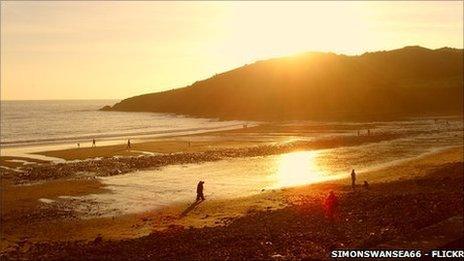Big beach watch clean-up starts on Gower
- Published

Langland Beach will be cleaned by volunteers
A beach litter survey and clean-up is starting across Wales this weekend, with Langland, on Gower, a focus.
Volunteers will be heading to 40 beaches across Wales surveying the amount of litter, as well as helping with the clean-up operation.
Organised by the Marine Conservation Society (MCS), it is aiming to halve litter on UK beaches by 2015.
Litter on Welsh beaches is higher than the national average with more than 3,000 items per kilometre.
Gill Bell, MCS Welsh Officer, said, "Langland beach has given so much pleasure to thousands throughout the summer now it's our turn to give something back.
"An hour or so of your time is all we ask to help give Langland back it's sparkle."
Langland is the "official" Welsh beach of the Marine Conservation Society Beachwatch programme and is cleaned quarterly by Ms Bell and volunteers.
Abersoch in Gwynedd, Lindsway Bay in Pembrokeshire, Broughton in Swansea and Swanbridge Bay, Vale of Glamorgan are among those taken part.
A full list of beaches involved in the clear up weekend is available on the Marine Conservation Society website, external.
Gill Bell said it was vital that people joined in.
"No one wants to visit a dirty beach. By cleaning Langland and other beaches around the Welsh coast, we'll be doing our bit for the environment, wildlife and visitors alike," she said.
She added: "It's not too late to take part. We need the public's help to clean and survey our beaches to help tackle the relentless tide of litter threatening our beaches and wildlife.
"The information our volunteers collect will help us tackle the main sources of litter and campaign to reduce the most common and harmful items ending up on our beaches and killing wildlife."
Marine litter kills wildlife, can be hazardous to people and costs millions to clear up.
Nore than 170 species of marine wildlife including seabirds, turtles and whales have been recorded mistaking marine litter for food, which may result in starvation, poisoning and fatal stomach blockages.
In addition, plastic packaging and discarded fishing nets can entangle and drown some of Britain's favourite marine animals, including seals and dolphins, the MCS said.
UK wide, there are two pieces of litter for every footstep you take on a beach and the amount on beaches has increased 146% since 1994, said the body.
The beach clean-up is taking place all weekend.
But volunteers who want to get involved at Langland should meet at the car park there by 1000 BST on Sunday and bring along "sensible clothing and footwear".
Children are welcome but must be supervised by a parent or guardian, the MCS said.
Gloves and equipment will be provided and the beach clean will take about one hour.
- Published18 September 2010